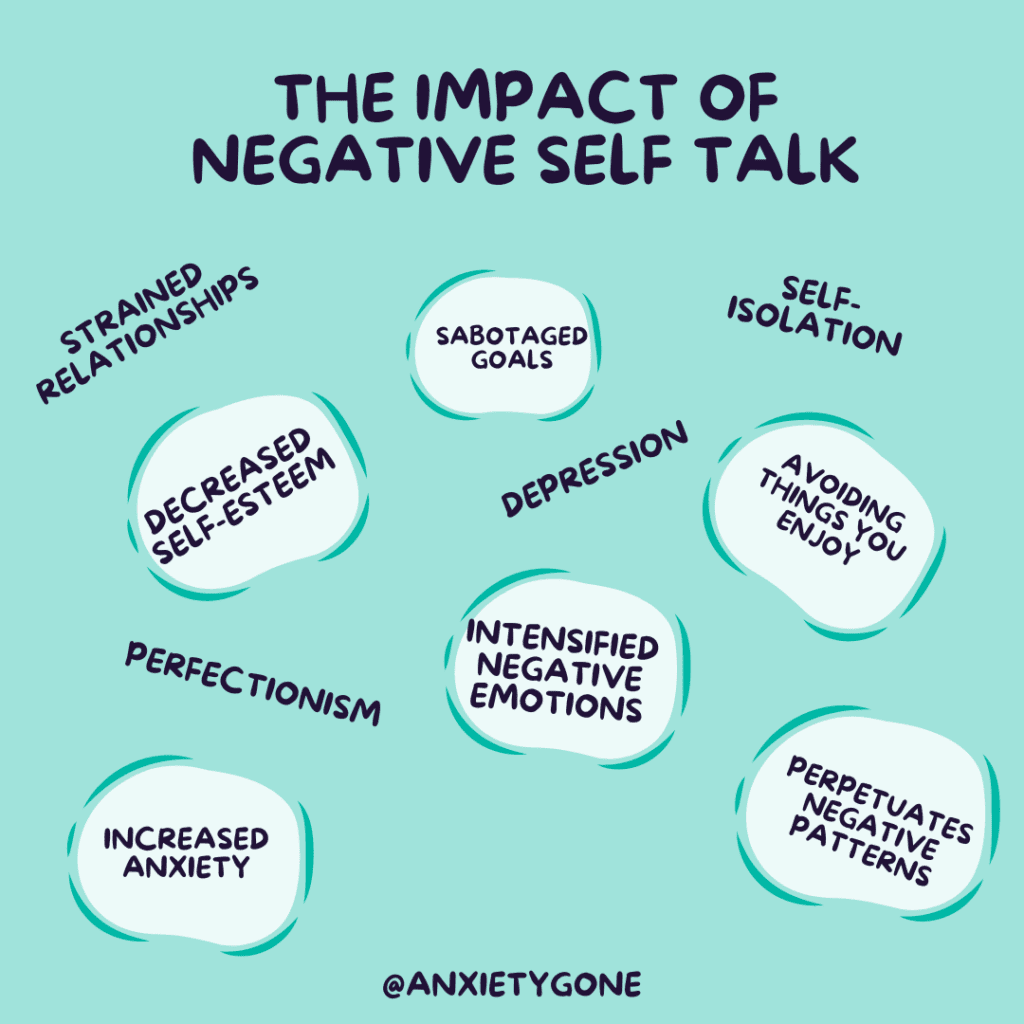Full Disclosure: Clicking on these links could mean a tiny commission for me, at no extra cost to you.
In a world where our inner voice can often be our toughest critic, it’s crucial to understand the power of self-talk. Negative self-talk is the internal dialogues that limit our capabilities and diminish our self-esteem. It can eventually become a significant barrier to personal happiness and success. But what if we could transform these harmful whispers into empowering conversations?
This comprehensive guide delves into the essence of negative self talk, uncovering its roots and the impact negative thinking has on our mental health and daily lives. We will explore the intricate web of negative thought patterns, and how they shape our perceptions and actions. More importantly, we will arm you with practical, actionable strategies to challenge and overcome these patterns. From identifying the sneaky ways in which negative thoughts manifest to embracing powerful techniques for positive thinking, this article is your ally in navigating the path towards a healthier, more optimistic mindset.
Understanding Negative Self Talk
Negative self talk, a common yet often overlooked aspect of our inner dialogue, has profound effects on our mental health and overall well-being. It’s that inner voice that criticizes, doubts, belittles, and generally speaks to us in a way that we would never speak to someone else. This internal monologue can range from mildly discouraging to severely debilitating, influencing our behavior, decision-making, and how we perceive the world around us.
What is Negative Self Talk
At its core, negative self talk is a form of self-criticism that can be both conscious and unconscious. It often manifests in absolutes and exaggerations: “I can’t do anything right,” “I’m a failure,” or “Nobody likes me.” These statements are not just reflections of our momentary feelings but are indicative of a deeper, more pervasive pattern of thinking that colors our view of ourselves and our capabilities.
- Personalizing: Here, you blame yourself for everything. For instance, if a friend cancels plans, you might think, “It’s because I’m boring and they don’t want to be around me,” rather than considering other reasons unrelated to you.
- Filtering: This involves magnifying the negative aspects of a situation and filtering out all of the positive ones. If you received compliments on a presentation but also some constructive feedback, you might focus only on the criticism.
- Catastrophizing: In this form, you anticipate the worst possible outcome in every situation. For example, if you make a small mistake at work, you immediately jump to thinking you’ll get fired.
- Polarizing: This is black-and-white thinking where you see things as either perfect or disastrous, with no middle ground. If something isn’t flawless, it’s a total failure in your eyes.
These patterns of negative self talk not only affect our mental health but also our physical health, relationships, and overall quality of life. By recognizing these patterns, we can begin to challenge and change them, paving the way for a more positive and fulfilling life experience.
The Impact of Negative Self Talk
Negative self-talk doesn’t just echo in the confines of our minds; it resonates through every aspect of our lives, influencing our emotions, behaviors, and even our relationships with others. Understanding these impacts is crucial in recognizing the need to transform our internal dialogue.
- Decreased Self-Esteem: Constant self-criticism can lead to a significant drop in self-esteem. When you’re always telling yourself you’re not good enough, it becomes a self-fulfilling prophecy.
- Increased Stress and Anxiety: Negative self-talk can exacerbate feelings of stress and anxiety. It’s like having a relentless critic in your head, constantly pointing out your flaws and mistakes.
- Risk of Depression: Over time, negative self-talk can contribute to feelings of hopelessness and helplessness, key symptoms of depression.
- Avoidance Behaviors: Negative self-talk often leads to avoiding challenges or new experiences due to fear of failure or judgment.
- Strained Relationships: When you’re burdened with negative self-perception, it can strain your relationships. You might withdraw from loved ones or react defensively because of your insecurities.
- Impact on Professional Life: This self-defeating talk can limit your career progression as you might hesitate to pursue opportunities or assert yourself in the workplace.
- Impaired Performance: Negative self-talk can undermine confidence and motivation, making it more difficult to focus, problem-solve, and perform well in various areas of life, such as work, school, or relationships.
- Perpetuates Negative Patterns: Engaging in negative self-talk reinforces negative thought patterns, creating a self-perpetuating cycle of pessimism, self-doubt, and self-criticism.
- Physical Health Effects: Prolonged exposure to negative self-talk can contribute to physical health issues such as headaches, digestive problems, and weakened immune function, as chronic stress negatively impacts the body.
- Hinders Achievements: Negative self-talk can sabotage efforts to set and achieve goals by creating self-imposed barriers and limiting beliefs about one’s capabilities and potential for success.
- Worsens Mental Health Conditions: Negative self-talk is commonly associated with mood disorders such as depression and can exacerbate symptoms, leading to feelings of hopelessness, helplessness, and worthlessness.
By recognizing these impacts, we can begin the process of transforming our self talk from negative to positive, thus improving not only our mental health but our overall quality of life.
Identifying and Challenging Negative Thought Patterns
The journey to a positive mindset begins with recognizing and challenging the negative thought patterns that hold us back. This crucial step not only brings awareness but also empowers us to take control over our internal narrative.
Recognizing Harmful Patterns
Understanding the nature of your negative self-talk is the first step towards change. There are many different kinds, but the most common patterns include:
- Overgeneralization: Seeing a single negative event as a never-ending pattern of defeat.
- Mind Reading: Assuming you know what others are thinking, usually negatively, without any evidence.
- Should Statements: Harboring a list of inflexible rules about how you and others should behave.
Recognizing these patterns requires mindfulness and self-reflection. Keeping a journal or discussing your thoughts with a therapist or trusted friend can be immensely helpful in this process.

Download our Overcoming Overthinking workbook
Techniques for Challenging Negative Thoughts
- Evidence-Based Thinking: When you catch yourself in negative self-talk, ask, “What evidence do I have to support this thought?” More often than not, you’ll find the evidence lacking.
- Perspective-Taking: Try to view the situation from different angles. Ask yourself, “What would I say to a friend who had this thought?”
- Positive Affirmations: Replace negative thoughts with positive affirmations that are realistic and based on your strengths and accomplishments.
By identifying and actively challenging these harmful thought patterns, we can start to break the cycle of negative self-talk and build a foundation for positive, empowering self-dialogue.
Strategies for Overcoming Negative Self Talk
Overcoming negative self-talk requires a combination of awareness, practice, and patience. It’s about gradually shifting your mindset and embracing more positive, affirming ways of thinking. Here are some effective strategies:
- Develop Personal Affirmations: Create affirmations that resonate with your personal values and goals. Repeat them daily to reinforce positive self-perception.
- Visualization: Imagine yourself successfully handling situations that typically trigger negative self-talk. Visualization can build confidence and reduce anxiety.
- Gratitude Practice: Regularly acknowledging things you’re grateful for can shift focus from negative to positive aspects of life.
- Mindfulness: Practice mindfulness to observe your thoughts without judgment. This awareness helps you recognize when you’re slipping into negative self-talk.
- Breathing Exercises: Simple breathing techniques can help calm your mind and provide clarity, making it easier to combat negative thoughts.
- Guided Meditation: Regular meditation can improve your ability to control your thoughts and stay focused on the positive.
These strategies are not just about stopping negative thoughts but about creating a more positive and compassionate internal dialogue. With consistent practice, they can help you develop a healthier, more optimistic mindset.
Exclusive Offer: Download The #1 Mindfulness App
Maintaining a Positive Mindset
Adopting a positive mindset is not just a one-time effort but a continuous journey. Maintaining a positive mindset involves habitual practice and a commitment to self-growth. Here’s how you can sustain this positive change:
- Regular Reflection: Set aside time for self-reflection to assess your progress and identify areas for improvement. Reflect on how your thoughts and behaviors have shifted.
- Seek Support: Surround yourself with supportive people who encourage your growth. Don’t hesitate to seek professional help if you find it challenging to manage negative self-talk.
- Continuous Learning: Stay open to learning new strategies and insights about positive thinking. Books, podcasts, and workshops can be valuable resources.
Long-Term Strategies for Mental Wellness
- Lifestyle Balance: Ensure a healthy balance in your life by incorporating activities that bring you joy and relaxation, alongside your responsibilities.
- Physical Health: Regular exercise, a balanced diet, and adequate sleep are essential for mental wellness. They can significantly impact your mood and energy levels.
- Positive Environment: Create an environment that reinforces positivity. This could be as simple as decluttering your space or as profound as setting healthy boundaries in relationships.
By integrating these practices into your daily life, you reinforce the positive changes you’ve made in your self-talk. Remember, it’s about progress, not perfection. Embrace the journey towards a more positive, fulfilling life.

Conclusion
Embarking on a journey to transform negative self-talk into a positive inner dialogue is a profound step towards enhancing mental health and overall wellness. Throughout this guide, we have explored the multifaceted nature of negative self-talk, its impacts, and the strategies to overcome it. From understanding and identifying negative thought patterns to actively employing techniques for positive thinking and maintaining a positive mindset, each step is crucial in building a healthier relationship with oneself.
Remember, the path to a positive mindset is not linear and requires continuous effort and patience. It’s about making small, consistent changes in how we speak to ourselves. The power of positive self-talk lies not just in silencing the negative but in cultivating an inner voice that is kind, supportive, and empowering.
As you integrate these practices into your daily life, you’ll find that not only does your self-talk become more positive, but so does your outlook on life. You’ll be better equipped to handle challenges, build stronger relationships, and embrace opportunities with confidence and optimism.
In the end, the journey towards positive self-talk is a journey towards self-love and acceptance. It’s a commitment to yourself, to nurture your well-being, and to create a life filled with positivity and joy. So, take this guide as your starting point, and embark on your journey to a happier, healthier you.















































